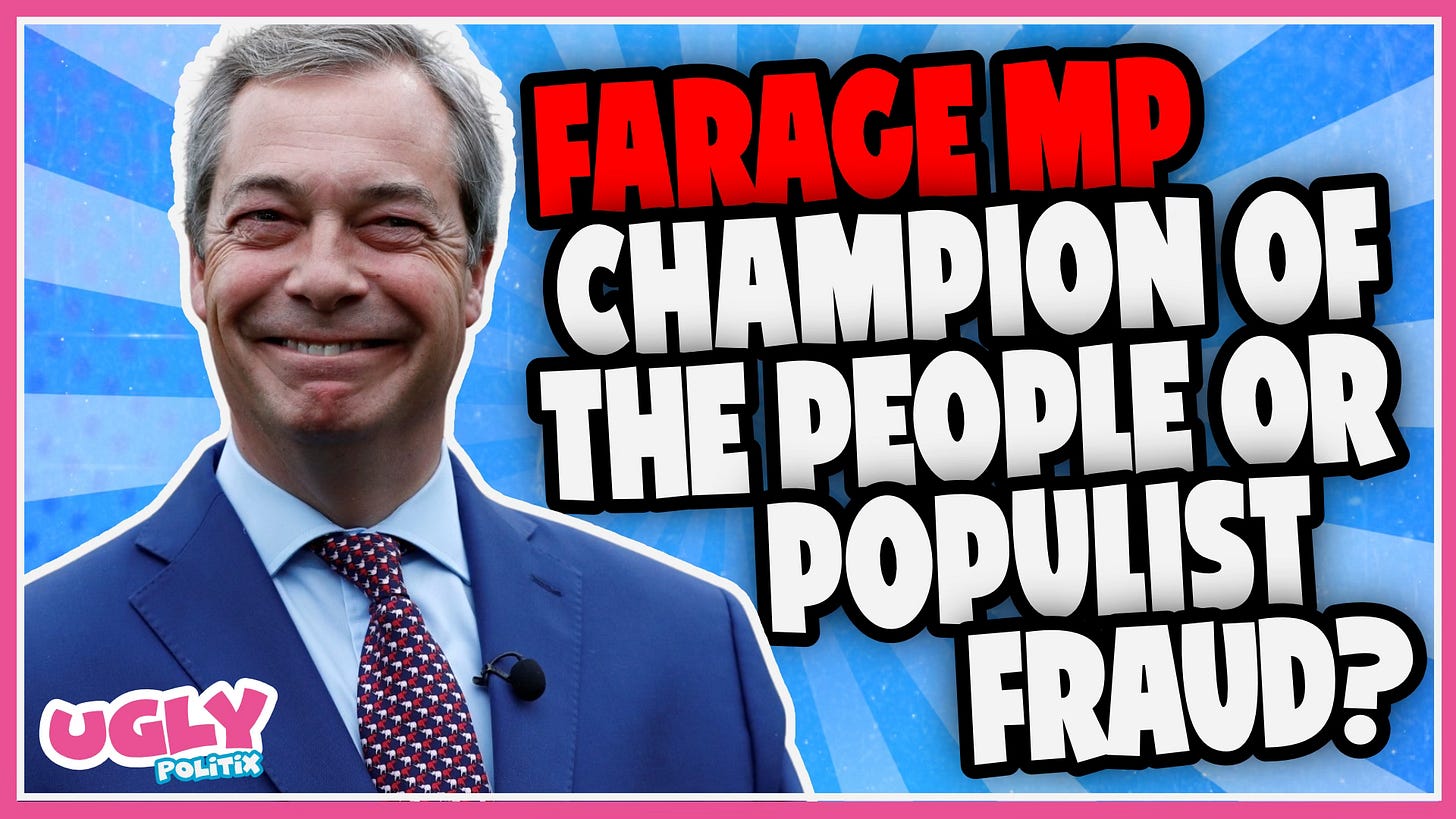From Rabble-Rouser to Representative
Nigel Farage's Failure to Rise to the Challenge of Constructive Governance
Nigel Farage, the perennial outsider of British politics, has finally achieved his long-held ambition of becoming a Member of Parliament. After seven unsuccessful attempts, Farage secured a resounding victory in Clacton, winning 46.2% of the vote (turnout: 58.7%). This electoral success should mark a pivotal moment in his political career – a transition from provocateur to lawmaker. However, early indications suggest that Farage is struggling to adapt to the responsibilities that come with his new role.
The position of MP is one of public service, demanding a commitment to ALL constituents (not just those who voted for you) and constructive participation in the legislative process. Yet, Farage's actions since taking his seat on July 9th raise serious questions about his priorities and his understanding of the role.
The first words he spoke in Parliament, rather than outlining a vision for the nation or paying gracious tribute to the people of Clacton for choosing him as their MP, reverted to type with a jibe about Brexit and former Speaker John Bercow. This provoked groans from fellow MPs and set a tone more reminiscent of his days as a political outsider than a serious legislator.
More concerning is the apparent lack of engagement with his Clacton constituents. A month on from his election, I can find no reports of Farage opening a constituency office, holding local meetings, or conducting surgeries – fundamental activities for any MP serious about representing their electorate. Instead, Farage found time to visit his old friend Donald Trump at the Republican National Convention in the United States. This jaunt across the Atlantic, presumably to pursue a potential role in a future Trump administration, speaks volumes about where Farage's true interests lie.
This behaviour suggests that Farage views his parliamentary seat not as a means to serve his constituents but as a platform to further his own political brand and international ambitions. It's a stark betrayal of the trust placed in him by the people of Clacton and a dereliction of his duties as an MP.
But that is not the most disturbing aspect of Farage’s performance so far.
As Neil Basu, the former head of counter-terrorism policing, pointed out, Farage’s failure quickly to denounce far-right violence is particularly troubling. As an elected representative, Farage has a responsibility to promote social cohesion and stand against extremism. His silence on this issue is deafening and potentially dangerous.
The irony of Farage's situation is hard to ignore. He has long railed against the political establishment, yet now finds himself a part of it. This presents him with a unique opportunity to effect change from within the system he has so vociferously criticised. However, rather than seizing this chance to prove his critics wrong and demonstrate his ability to govern constructively, Farage appears content to continue his role as a political gadfly.
This behaviour is not just a disservice to his constituents; it undermines the very foundations of our representative democracy. It feeds into a cynical narrative that politicians are self-serving and out of touch, further eroding public trust in our institutions.
The rise of Reform UK underscores the public’s current dissatisfaction and appetite for political change in Britain. However, change should not come at the cost of effective governance and responsible representation. Farage and his colleagues have a duty to translate their populist promises into workable policies and to engage constructively with the parliamentary process.
As we reflect on Farage's early performance as an MP, we must also consider the system that has allowed this situation to arise. Our first-past-the-post electoral system often rewards divisive figures who can mobilise a passionate minority, rather than consensus-builders who can unite a broad coalition. This is why the call for electoral reform, ironically one of Farage's own campaign promises, is more crucial than ever.
A more proportional system would encourage politicians to appeal beyond their base and work collaboratively, rather than relying on populist tactics and divisive rhetoric. It would also ensure that the diversity of political views in the country is more accurately reflected in Parliament.
In conclusion, Nigel Farage's early days as an MP serve as a cautionary tale. They remind us of the importance of holding our elected representatives to account and demanding that they fulfil their responsibilities to their constituents and the country (to us!). As voters, we must insist on a higher standard of conduct and problem-solving from all our MPs, regardless of their political stripe.
Farage now has a choice. He can continue down his current path, using his position to grandstand and pursue personal ambitions, or he can rise to the challenge of constructive governance. The people of Clacton, and indeed the entire nation, deserve nothing less than his full commitment to the job they have elected him to do. It's time for Nigel Farage to decide: will he be a representative of the people, or merely a rabble-rouser in a new arena?






Excellent analysis. I thought he may have grown up after being elected but no....his useless and dangerous remarks show he is not going to be an asset in his lifetime or afterwards.....